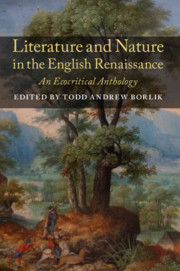Book contents
- Frontmatter
- Contents
- List of Illustrations
- Acknowledgements
- Editorial Principles: Towards the Ecocritical Editing of Renaissance Texts
- Introduction
- PART I Cosmologies
- PART II The Tangled Chain
- PART III Time and Place
- PART IV Interactions
- Animal-Baiting
- Hunting, Hawking
- Fishing
- Pet-Keeping
- Cooking, Feasting, Fasting, Healing
- PART V Environmental Problems in Early Modern England
- PART VI Disaster and Resilience in the Little Ice Age
- Appendix A Industrialization and Environmental Legislation in the Early Anthropocene: A Timeline
- Appendix B Further Reading: A Bibliography of Environmental Scholarship on the English Renaissance
Hunting, Hawking
from PART IV - Interactions
Published online by Cambridge University Press: 05 June 2019
- Frontmatter
- Contents
- List of Illustrations
- Acknowledgements
- Editorial Principles: Towards the Ecocritical Editing of Renaissance Texts
- Introduction
- PART I Cosmologies
- PART II The Tangled Chain
- PART III Time and Place
- PART IV Interactions
- Animal-Baiting
- Hunting, Hawking
- Fishing
- Pet-Keeping
- Cooking, Feasting, Fasting, Healing
- PART V Environmental Problems in Early Modern England
- PART VI Disaster and Resilience in the Little Ice Age
- Appendix A Industrialization and Environmental Legislation in the Early Anthropocene: A Timeline
- Appendix B Further Reading: A Bibliography of Environmental Scholarship on the English Renaissance
Summary
The wolf was once common throughout Anglo-Saxon England, as the name of the first warrior-hero in English literature (Beowulf) hints. As the medieval economy came increasingly to depend on the wool trade, however, the wolf posed an obvious financial liability. Despite Caius's claim here, evidence indicates that small populations may have survived in northern England and Wales up until the late fifteenth century. Edward I (r. 1272–1307) commissioned a professional wolf-trapper to exterminate them, and a wolf-hunter was employed in Sherwood Forest as late as 1432. While these campaigns took a toll, no doubt it was the steady diminishing of its woodland habitat that brought about the wolf 's demise. The wolf proved harder to eradicate in Scotland, where King James VI ordered wolfhunts three times per year and placed a bounty on them of six shillings per head. Legend has it that Sir Ewen Cameron slew the last wolf in 1680 in the Scottish Highlands, where proposals now are being considered to reintroduce the species to help keep the deer population under control.
Source: Of English Dogs, trans. Abraham Fleming (1576), 23–4.
Our shepherd's dog is not huge, vast, and big, but of an indifferent stature and growth, because it hath not to deal with the bloodthirsty wolf, since there be none in England, which happy and fortunate benefit is to be ascribed to the puissant Prince Edgar, ° who, to the intent that the whole country might be evacuated and quite cleared from wolves, charged and commanded the Welshmen (who were pestered with these butcherly beasts above measure) to pay him yearly tribute: which was … 300 Wolves. Some there be which write that Ludwall, Prince of Wales, paid yearly to King Edgar 300 wolves in the name of an exaction (as we have said before). And that by the means hereof within the compass and term of [24] four years, none of those noisome and pestilent Beasts were left in the coasts of England and Wales. This Edgar wore the Crown royal and bore the Sceptre imperial of this kingdom about the year of our Lord 959, since which time we read that no Wolf hath been seen in England, bred within the bounds and borders of this country.
- Type
- Chapter
- Information
- Literature and Nature in the English RenaissanceAn Ecocritical Anthology, pp. 336 - 352Publisher: Cambridge University PressPrint publication year: 2019



